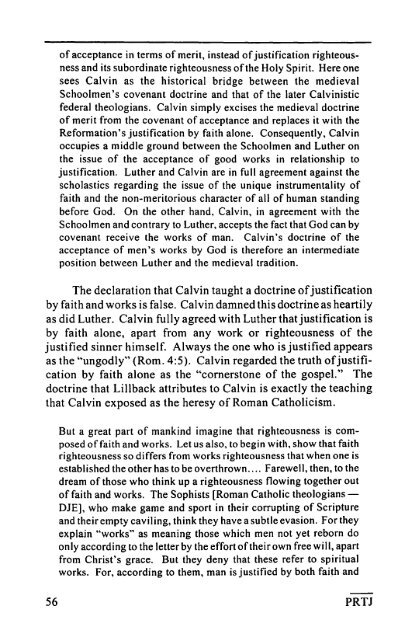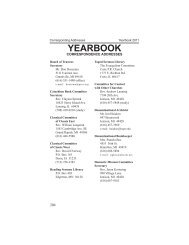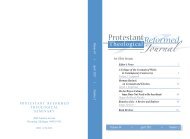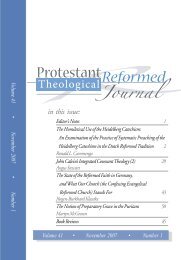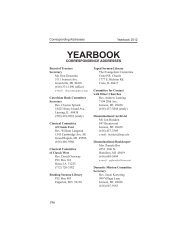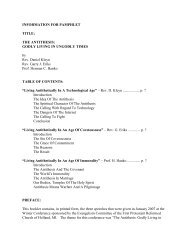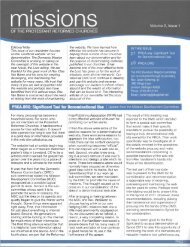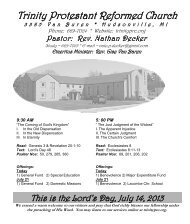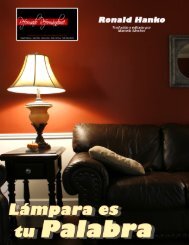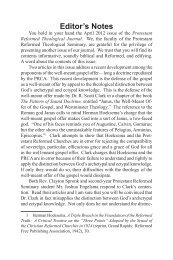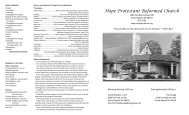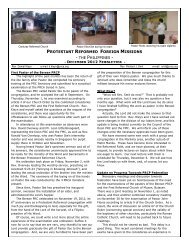pdf - Protestant Reformed Churches in America
pdf - Protestant Reformed Churches in America
pdf - Protestant Reformed Churches in America
You also want an ePaper? Increase the reach of your titles
YUMPU automatically turns print PDFs into web optimized ePapers that Google loves.
ofacceptance <strong>in</strong> terms of merit, <strong>in</strong>stead ofjustification righteousnessand its subord<strong>in</strong>ate righteousness ofthe Holy Spirit. Here onesees Calv<strong>in</strong> as the historical bridge between the medievalSchoolmen's covenant doctr<strong>in</strong>e and that of the later Calv<strong>in</strong>isticfederal theologians. Calv<strong>in</strong> simply excises the medieval doctr<strong>in</strong>eof merit from the covenant of acceptance and replaces it with theReformation's justification by faith alone. Consequently, Calv<strong>in</strong>occupies a middle ground between the Schoolmen and Luther onthe issue of the acceptance of good works <strong>in</strong> relationship tojustification. Luther and Calv<strong>in</strong> are <strong>in</strong> full agreement aga<strong>in</strong>st thescholastics regard<strong>in</strong>g the issue of the unique <strong>in</strong>strumentality offaith and the non-meritorious character of all of human stand<strong>in</strong>gbefore God. On the other hand, Calv<strong>in</strong>, <strong>in</strong> agreement with theSchoolmen and contrary to Luther, accepts the fact that God can bycovenant receive the works of man. Calv<strong>in</strong>'s doctr<strong>in</strong>e of theacceptance of men's works by God is therefore an <strong>in</strong>termediateposition between Luther and the medieval tradition.The declaration that Calv<strong>in</strong> taught a doctr<strong>in</strong>e ofjustificationby faith and works is false. Calv<strong>in</strong> damned this doctr<strong>in</strong>e as heartilyas did Luther. Calv<strong>in</strong> fully agreed with Luther that justification isby faith alone, apart from any work or righteousness of thejustified s<strong>in</strong>ner himself. Always the one who is justified appearsas the '"ungodly" (Rom. 4:5). Calv<strong>in</strong> regarded the truth ofjustificationby faith alone as the '"cornerstone of the gospel." Thedoctr<strong>in</strong>e that Lillback attributes to Calv<strong>in</strong> is exactly the teach<strong>in</strong>gthat Calv<strong>in</strong> exposed as the heresy of Roman Catholicism.But a great part of mank<strong>in</strong>d imag<strong>in</strong>e that righteousness is composedoffaith and works. Let us also, to beg<strong>in</strong> with, show that faithrighteousness so differs from works righteousness that when one isestablished the other has to be overthrown.... Farewell, then, to thedream of those who th<strong>in</strong>k up a righteousness flow<strong>in</strong>g together outoffaith and works. The Sophists [Roman Catholic theologiansDJE], who make game and sport <strong>in</strong> their corrupt<strong>in</strong>g of Scriptureand their empty cavil<strong>in</strong>g, th<strong>in</strong>k they have a subtle evasion. For theyexpla<strong>in</strong> "works" as mean<strong>in</strong>g those which men not yet reborn doonly accord<strong>in</strong>g to the letter by the effortoftheir own free will, apartfrom Christ's grace. But they deny that these refer to spiritualworks. For, accord<strong>in</strong>g to them, man is justified by both faith and56 PRTJ


